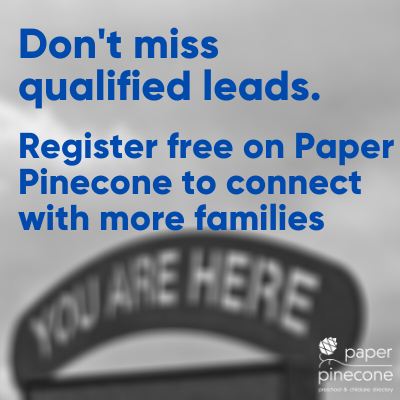How to Be a Great Preschool Boss

Published Date: 10/24/19
Effectively managing people is critical to attracting and retaining top talent in all businesses. In fact, 75% of workers don’t quit their jobs, they quit their bosses. So, what are the keys to being a boss who people want to work for? And what are the keys to running a preschool that attracts and retains top talent, and keeps the families they serve happy?
REACH MORE FAMILIES WHEN YOU REGISTER ON THESE FREE DIRECTORIES
There are essential components of leadership to follow, whether you’re managing a director, assistant director, teachers, aides, or other staff in your center. Much of it comes down to setting clear expectations and communicating regularly.
1. Clearly define positions: In childcare, as with any organization, employees must know what their job entails to perform it well. You must provide, in writing, roles and responsibilities so every staff member knows what’s expected of them and who is responsible for what.
2. Pave a path to the future: If you don't tell employees what their future is at your company, they may not see it. Explain what opportunities for advancement exist and how you see their role evolving over time. How you view the roles in your organization will be reflected by your employees. Are these stepping stones or dead ends?
3. Set goals and key performance indicators (KPIs): While often confused, goals and KPIs are not the same. A goal is the final desired outcome. You should set both short- and long-term goals with the input of the people you’re managing to ensure they’re realistic. They also may have goals for themselves you have not considered. KPIs are metrics that help determine if someone is on their way to meeting a goal. For example, you might set a goal of a 90% retention rate for all families who don’t age out of your program. A KPI would be periodic surveys and feedback from families to determine if you’re meeting their needs throughout the year.
4. Communicate, communicate, communicate: Did we mention communicate? An employee should always know how they’re performing without having to wait for an annual formal performance evaluation. You should be providing informal feedback consistently, with more formal conversations as needed. The positive informal feedback might be as simple as acknowledging a job well done on a specific task or thanking an employee for going above and beyond. There will also be a need to provide constructive feedback from time-to-time. Sometimes this will include a formal write-up and other times it might be an email or conversation about a performance issue. Regardless of the format, you must be clear on the issue, provide actionable ways to improve, a timeline for improvement, and unambiguous consequences if expectations are not met. Read more about effective communication in childcare here.
IF YOU'RE NOT BLOGGING YOU'RE MISSING OUT ON HUGE AMOUNTS OF REVENUE
5. Solicit feedback: When you’re the boss, you need to rely on input from employees to determine if you’re a successful leader. You should put formal and informal channels in place to obtain feedback from your employees on your performance and the business. You also must have an anonymous method for employees to communicate with you and create an atmosphere where they do not fear retribution for being critical or suggesting changes.
6. Be available: Employees should always know they can come to you with questions or concerns. Have an open door policy, cultivate dialog with your staff, and create a welcoming atmosphere for them. Respond promptly to their requests, even if you can’t fulfill them.
7. Implement annual performance evaluations: Formal performance evaluations give you an opportunity to review all goals set for the year and determine if your employees missed, met, or exceeded expectations. Tie raises and perks to performance evaluations, and those should be given at the same time, or soon after the annual review. A great performance review has:
a) a discussion - a two-way conversation about the employee’s performance
b) a reflection of the goals that were achieved and ones that were missed, coaching
c) coaching of the employee in the areas identified for improvement
d) clear next steps agreed upon by you and the employee
PAPER PINECONE IS THE #1 MOST TRUSTED CHILDCARE RESOURCE - PROVIDERS ALWAYS LIST FREE
8. Empower employees: Empowering employees is critical to the success of your business. Not only are empowered employees happier and more loyal but they create happy, loyal customers. Hire employees who you trust to make the decision they believe is in the best interest of the children and families you serve, and in your business. At times, you won’t agree with the decision they made and that’s an opportunity to provide constructive feedback. However, remember that just because it’s different than the decision you would have made, doesn’t mean it’s wrong. This also includes delegating responsibility. If you believe that you’re the only one who can do something right, employees will feel undermined and won’t stick around. Delegating elevates employees and adds to a sense of pride in their work.
9. Be decisive: While it’s important that you consistently solicit input from your staff, making quick decisions based on rational thought builds your credibility. It’s consistently ranked as a top quality for effective leaders.
10. Admit mistakes: We are all human and make mistakes. When you make a mistake, it’s essential that your employees see you own up to it and address how you’re correcting it. Taking responsibility for your errors enhances your employees’ perception of your leadership ability.
11. Don’t finger point: You are, in part, responsible for your team’s successes and failures. When something goes wrong, evaluate the situation and address it without singling out an individual. Consider how your actions contributed to the situation and what you can do to prevent it from reoccurring. Maybe it can it be attributed to lack of training or poor communication between staff members, for example. Take action to prevent the same mistake from happening twice.
ARE YOU TEACHING CHILDREN TO COMMUNICATE OR TO WRITE?
12. Lead by example: It’s incredibly frustrating for employees to have a boss who hasn’t done their job and doesn’t understand the dynamics. If you’re an owner who’s never been in the classroom, get in there. If you’ve never jumped in to help prepare food when the chef calls out sick, now is the time to start chopping vegetables. If you say, “that’s not my job” you can bet that your staff will have the same attitude. The best bosses are the ones who demonstrate on a daily basis that they aren’t above the other staff members and are in tune with every aspect of the organization.
Adopt your own leadership style while following these tips is a critical component of attracting and retaining the best staff at your school. And the best staff leads to happy families. Happy families give referrals.
Paper Pinecone is the #1 most trusted childcare marketplace. Register your program today at no cost to connect with thousands of parents searching for the best preschool and daycare programs in their area.
This post may contain affiliate links.
- stacey's blog
- Log in or register to post comments





